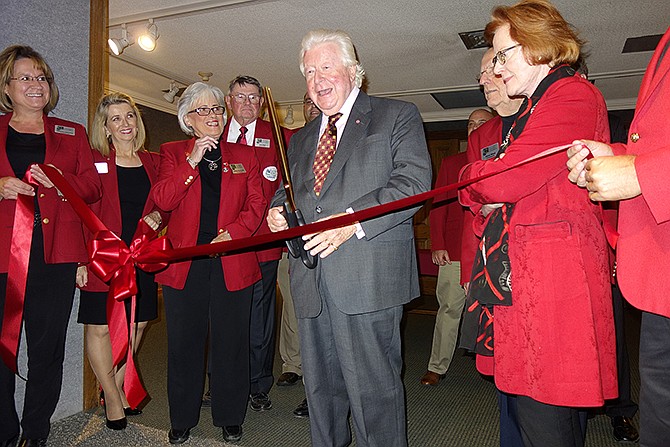For New York City artist Edwina Sandys, visiting the National Churchill Museum at Westminster College is like a homecoming.
After all, the museum honors her grandfather, Sir Winston Churchill, former British prime minister, statesman, writer and artist.
"It's always a big day when I come here," she said.
Thursday was a day of ceremonies commemorating the visit Churchill made to Westminster College seven decades ago, a time when he made what is now referred to as his "Iron Curtain" speech. That speech accurately predicted the post-World War II "Cold War" and years of uncomfortable relations with the Soviet Union.
Churchill was invited to the college by then President Harry Truman and gave the speech in 1946. In it, he said: "From Stettin in the Baltic to Trieste in the Adriatic, an iron curtain has descended across the continent. "
Churchill said a lot of things, somber and funny, and is often quoted. "Never, never, never give up." "If you're going through hell, keep going." "Attitude is a little thing that makes a big difference." The gift shop at the museum has T-shirts and other items emblazoned with Churchill quotes.
Sandys thought about her personal favorite.
"I do like the one, 'I'm very easy to please. I'm very satisfied with the best,'" she said, laughing.
A select group of guests was invited to a private luncheon with the day's dignitaries, with the same menu - including tomato aspic and Callaway County ham - served to Truman and Churchill. Westminster College President Benjamin Ola. Akande and museum Director Tim Riley welcomed all.
"We're glad you're here for the kind of luncheon we don't have every Wedneday," Riley said, laughing.
Akande also reminded guests of a Westminster alumni and former trustee, Overton Harris, who passed away Monday.
"We remember a man who had a significant impact on us," Akande said. "His love for Westminster, the city of Fulton and Callaway County was deep."
In Fulton, Sandys is perhaps best known for her "Breakthrough" sculpture, formed from eight panels of the Berlin Wall, on a rise just outside the museum. After a lunch, she and the other honored guest, Lord Alan Watson, author and British parliamentarian, talked to young students from McIntire Elementary in the Church of St. Mary, Aldermanbury.
"Did you actually know Churchill?" one student asked.
"I was a child most of the time that I knew him," Sandys answered. "He had a house in the country, and he loved to paint after he was done doing what made him famous, making speeches and being prime minister. At home, he was very relaxed. After a meal, he would recite poetry. And he had more than 500 paintings."
She also talked about her sculpture, asking children if they had walked through cut outs - of a man and a woman - in the Berlin Wall panels.
"I made the templates and the design for it," she said. "It was cut out with a water jet. I just had to have the right idea and give it a design and name it."
The piece was unveiled by Sandys and President Ronald Reagan during his Nov. 9, 1990, visit to Fulton. A crowd of about 7,000 lined the streets for the event.
Lord Watson also addressed the children, one of whom became confused thinking he was, indeed, Churchill, who lived 1874-1965.
"He was the most extraordinary individual of the 20th century," Watson said. "I love his sense of humor. He's one of those people who is dead but actually alive through his works."
Another child asked him how he became a member of the House of Lords. Watson said he was making an appearance with Churchill's son, Randolph, when a similar question came.
"What does it feel like to be a Churchill? Randolph said 'You get used to it,'" Watson said. "How do you become a lord? It's a secret."
Watson also had a book signing for this new book, "Churchill's Legacy: Two Speeches to Save the World."
He and Sandys also cut the ribbon for a new exhibition at the museum, "Sinews of Peace: Power of Prose," featuring Churchill's original draft of the "Iron Curtain" speech.
"Churchill wrote his own speeches," Watson said. "They're not ghosted. He wrote his own."
Watson was expected to make a long speech Thursday evening in the same historical gymnasium on the campus where Churchill spoke - with the same podium and decorated similarly.

